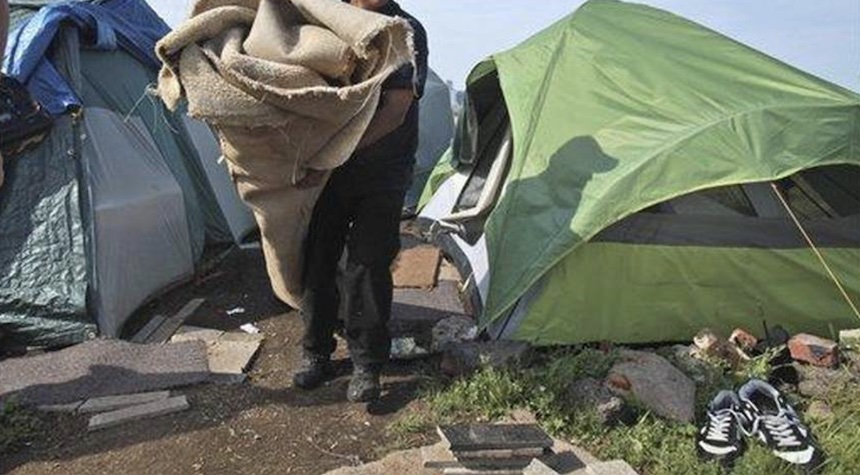Phoenix business owners are celebrating a rare victory in a case against Phoenix regarding how they handled a growing homeless population downtown.
Maricopa County Superior Court Judge Scott Blaney ruled Monday that city officials must stop enabling the hundreds of homeless camping out on a broad swath of downtown Phoenix, known as “The Zone,” and act quickly to find accommodations.
Maricopa County currently has over 9,000 homeless residents within its borders. The majority of them live in “The Zone,” which is where the majority of the country’s population also lives. Business owners claim that this situation poses a danger to their business and patrons’ health and safety.
The plaintiffs claimed that they are constantly exposed to unsafe conditions at work and have to deal with human waste and drug paraphernalia in order to open their shops. Even though they live in relatively safe areas, they deal with homeless people setting fires around their shops and restaurants. They also have to contend with mentally ill individuals invading their businesses and destroying their facilities, driving customers away.
Joe Faillace runs a sandwich shop in the neighborhood. It spans 7th avenue to 15, between Van Buren street, Grant street, and 15th avenue. The New York Times recently featured Joe Faillace. Faillace, who is one of the plaintiffs in the case, says that he and Debbie, his wife (and business partner), have tried over the years, to develop a spirit of cooperation with the homeless population. Although they have provided food, toilet facilities, and jobs to the homeless, it has not been enough for them to keep their shop safe. Debbie, 60, can’t walk alone from her car to her shop without an escort. NYT was able to witness the stress Debbie and Joe experience every day while interviewing them. A homeless woman took a seat at one of the small shop’s tables and started acting out.
“I need to place a huge order,” a woman said as she walked up to the counter wearing mismatched shoes and carrying a garbage bag of her belongings. “I own Dairy Queen.”
“Oh, wow. Debbie, who was playing along, asked which one.
The woman replied, “All of them,” “I’m the queen of the queen.”
“That’s wonderful,” Debbie said as she led the woman to a table with a menu and a glass of water and watched as the woman emptied her bag onto the table, covering it with rocks, expired bus passes, a bicycle tire, clothing, 17 batteries, a few needles, and a flashlight. “Would you like me to take an order?” Debbie asked.
The woman suddenly banged her fist against a table and said “You know why” “Don’t patronize me. The king requires his payment.
Debbie filled the water bottle for the woman and then walked behind the counter in search of Joe. She had been suffering from stomach pains and headaches for several months. Joe had heard her tell him she was leaving Old Station. She suggested that the restaurant be closed down, boarded up, or that she move away from Phoenix. She began looking into Prescott real estate, a small community about 100 miles from Phoenix, with a weekly art walk, mountain air, and a few lakes.
She asked him, “What should I tell her?” “I can’t continue doing this. It’s something every minute.
Plaintiffs such as the Faillices claim they have been largely left to deal alone with the problems because the city has refused to enforce vagrancy laws, and law enforcement is overwhelmed by distress calls – up to eight calls per day in The Zone.
This situation has affected customers, income, and quality of life. NYT reported that Joe Faillices said that businesses located within a mile of his home sell for as much as a million dollars. His last offer for his shop was just $150,000. Any rational investor would not take on the encampment.
Judge Blaney’s ruling represents a small step for the taxpayer and drops insanity in a growing insane environment. The situation spiraled out of control after the city of Phoenix decided to stop enforcing vagrancy and health laws. Even worse, Phoenix authorities actively punished business owners who enacted their own safety measures to protect their customers’ entrances. These included planters, artwork, and other scenic structures to discourage homeless people from sleeping in their entranceways. Blaney’s ruling states that the city cannot do this anymore.
Blaney stated in the ruling obtained by AZ Law that the encampment witnessed crime and drug use rise in the years since the city “intentionally suspended – or at the least materially decreased – enforcement of criminal and other quality-of-life statutes and ordinances”.
Officials from the city claimed they could reduce the amount of homelessness in the region as they saw fit.
Blaney directed the city’s removal of tents and biohazards such as feces and urine, and drug paraphernalia. Blaney also prohibited the city’s enforcement of a ban on local businesses erecting structures near its entrance to deter homeless people from sleeping in their cars.
America’s cities are in shocking decline due to the bizarre homeless laws (or absence thereof), that favor addicts over taxpayers, who pay for the city’s salaries and support it. Many businesses are fleeing once-prosperous and highly sought-after downtown areas in major cities such as San Francisco, Denver, and Seattle.
Democrat leaders have shown no interest in protecting taxpayers or their voters.
It seems that it is inevitable. Without a base of voters willing to punish politicians, lawsuits such as the Phoenix business owners are the only way to restore some sense of normalcy.


